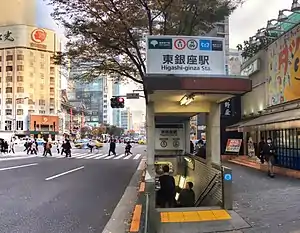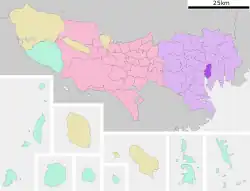Higashi-ginza Station
Higashi-ginza Station (東銀座駅, Higashi-ginza-eki) is a subway station on the Asakusa Line, operated by the Tokyo Metropolitan Bureau of Transportation (Toei), and on the Hibiya Line operated by Tokyo Metro. The Hibiya Line station is subtitled "Kabukiza-mae". The station is located in Ginza, Chūō, Tokyo, Japan. Its numbers are A-11 and H-10.
A11 H10 Higashi-ginza Station 東銀座駅 | |||||||||||||||||||||
|---|---|---|---|---|---|---|---|---|---|---|---|---|---|---|---|---|---|---|---|---|---|
 A1 exit, 2018 | |||||||||||||||||||||
| General information | |||||||||||||||||||||
| Location | 4-10-10-saki (Asakusa Line) 4-12-15-saki (Hibiya Line) Ginza District, Chūō City, Tokyo Japan | ||||||||||||||||||||
| Operated by | |||||||||||||||||||||
| Line(s) | H Hibiya Line A Asakusa Line | ||||||||||||||||||||
| Platforms | 1 island platform (Hibiya Line) 2 side platforms (Asakusa Line) | ||||||||||||||||||||
| Tracks | 4 (2 for each line) | ||||||||||||||||||||
| Construction | |||||||||||||||||||||
| Structure type | Underground | ||||||||||||||||||||
| Other information | |||||||||||||||||||||
| Station code | A-11, H-10 | ||||||||||||||||||||
| History | |||||||||||||||||||||
| Opened | 28 February 1963 | ||||||||||||||||||||
| Passengers | |||||||||||||||||||||
| FY2019 | 91,855 daily (Tokyo Metro) 86,726 daily (Toei) | ||||||||||||||||||||
| Services | |||||||||||||||||||||
| |||||||||||||||||||||
Station layout
Higashi-ginza station consists of two stations perpendicular to each other: the Toei and Tokyo Metro stations.
Toei station
Running underneath Shōwa Street (昭和通り, Shōwa-dori) Higashi-ginza's Asakusa Line station has two platforms serving two tracks. Platform 1 is for passengers bound for Sengakuji and Nishi-Magomes. Platform 2 is for those traveling in the opposite direction, toward Nihombashi and Oshiage Stations.
| 1 | A Asakusa Line | for Sengakuji and Nishi-magome KK Keikyu Main Line for Shinagawa, Haneda Airport (International Terminal and Domestic Terminal) and Misakiguchi |
| 2 | A Asakusa Line | for Nihombashi and Oshiage KS Keisei Main Line for Aoto, Keisei Funabashi and Narita Airport (Terminal 2·3 and Terminal 1) HS Hokusō Line for Imba Nihon-idai KS Narita Sky Access Line for Narita Airport SR Shibayama Railway Line for Shibayama-Chiyoda |
 Toei platforms, 2022
Toei platforms, 2022
Tokyo Metro station
The Tokyo Metro component of Higashi-ginza station runs below Harumi Street (晴海通り, Harumi-dori). On the Hibiya line, an island station serves the two tracks. Platform 3 is for Ginza and Naka-Meguro Stations, and trains depart Platform 4 for Ueno, Kita-Senju, and Minami-Kurihashi on the Tobu Skytree Line and Tōbu Nikkō Line.
| 3 | H Hibiya Line | for Ginza, Roppongi, and Naka-Meguro |
| 4 | H Hibiya Line | for Ueno, Kita-Senju TS Tobu Skytree Line for Tōbu-Dōbutsu-Kōen TN Tobu Nikko Line for Minami-Kurihashi |
 Tokyo Metro platforms, 2017
Tokyo Metro platforms, 2017 Station ticket gates and ticket machines, 2018.
Station ticket gates and ticket machines, 2018.
History
Higashi-ginza Station opened on February 28, 1963, as a station on Toei Line 1 and Hibiya Line. Later in 1978, Toei Line 1 was renamed the Asakusa Line.
The station facilities of the Hibiya Line were inherited by Tokyo Metro after the privatization of the Teito Rapid Transit Authority (TRTA) in 2004.[1]
Passenger statistics
In fiscal 2019, the Tokyo Metro station was used by an average of 91,855 passengers per day,[2] and Toei Station was used by an average of 86,726 passengers per day.[3]
Surrounding area
The station serves the eastern part of the Ginza. In the area are the Kabuki-za, the Shinbashi Enbujō (a theater owned by Shochiku), the Tōgeki (a Shochiku cinema), the Electric Power Development Company, and the Courtyard by Marriott Tokyo Ginza Hotel.
References
- "「営団地下鉄」から「東京メトロ」へ" [From "Teito Rapid Transit Authority" to "Tokyo Metro"]. Tokyo Metro Online (in Japanese). 2006-07-08. Archived from the original on 16 May 2012. Retrieved 29 May 2022.
- 各駅の乗降人員ランキング 2019年度 [Station usage ranking FY2019] (in Japanese). Japan: Tokyo Metro. 2020. Archived from the original on 10 January 2021. Retrieved 2021-02-11.
- 各駅乗降人員一覧 [The number of passengers] (in Japanese). Japan: Tokyo Metropolitan Bureau of Transportation. 2020. Archived from the original on 10 January 2021. Retrieved 2021-02-11.
External links
- Higashi-ginza Station information (Tokyo Metro) (in English)
- Higashi-ginza Station information (Tokyo Metro) (in Japanese)
- Higashi-ginza Station information (Toei) (in English)
- Higashi-ginza Station information (Toei) (in Japanese)
